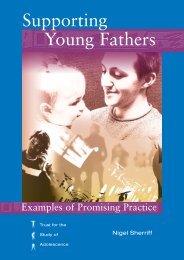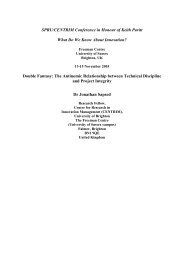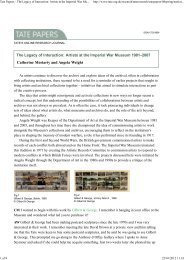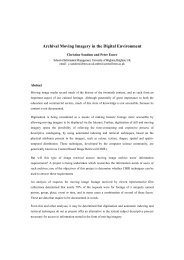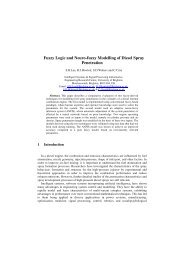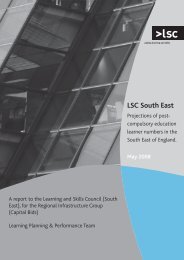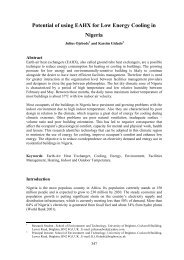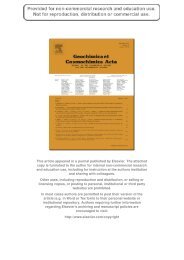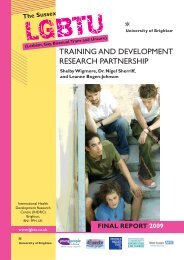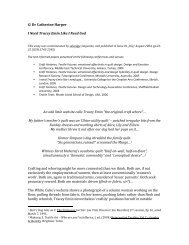a randomised controlled trial (MATISSE). - ResearchGate
a randomised controlled trial (MATISSE). - ResearchGate
a randomised controlled trial (MATISSE). - ResearchGate
Create successful ePaper yourself
Turn your PDF publications into a flip-book with our unique Google optimized e-Paper software.
DOI: 10.3310/hta16080<br />
Chapter 4<br />
Results<br />
Recruitment and randomisation<br />
Health Technology Assessment 2012; Vol. 16: No. 8<br />
Study recruitment commenced in February 2007. The rate of recruitment was slower than<br />
anticipated. Interviews with front-line staff conducted to explore this suggested that this was<br />
the result of several interconnected factors. 53 These included pressure of clinical work, which<br />
had intensified following reconfiguration of services. Clinical staff did not view involvement in<br />
research as a priority. Moreover, clinicians had concerns about the rationale for the study and the<br />
ethical issues it raised. Some considered it unfair to withhold art therapy from people who were<br />
interested in receiving it, whereas others reported being unclear about what art therapy involved<br />
and whether or not mental health services should be referring people for this treatment. 57 In<br />
response to these difficulties, we convened a range of formal and informal meetings with clinical<br />
staff to publicise the study and address these concerns. We also increased the number of sites that<br />
we recruited from and extended the period of recruitment.<br />
Between February 2007 and the end of August 2008, 649 people were formally assessed for<br />
participation in the study. Of these, 417 (64%) were eligible and were <strong>randomised</strong>. The reasons<br />
for non-participation were: not willing to provide consent (n = 167, 72%), not having a diagnosis<br />
of schizophrenia (n = 41, 18%), already receiving an arts therapy at the point of the assessment<br />
(n = 15, 6%), moderate or severe cognitive impairment (n = 6, 3%) and insufficient spoken English<br />
to complete the BSL assessment (n = 3, 1%). A total of 131 participants were recruited in west<br />
London, 115 in north London, 103 in the west of England and 68 in Belfast. Of the 417 people<br />
who took part in the study, 140 were allocated to group art therapy, 140 were allocated to the<br />
activity group and 137 to standard care.<br />
Reliability of Global Assessment of Functioning Scale ratings<br />
Inter-rater reliability of researcher GAF ratings was assessed during the first year of the study.<br />
Researchers independently rated 24 written-case vignettes. Using a two-way mixed-effects model,<br />
the ICC was found to be 0.57 [95% confidence interval (CI) 0.41 to 0.74].<br />
Characteristics of the study sample at baseline<br />
The sociodemographic and clinical characteristics of study participants at BSL are presented in<br />
Table 1. Participants ranged in age from 18 to 72 years and two-thirds (n = 279, 67%) were male.<br />
Around three-quarters described their ethnicity as white and the remainder reported being from<br />
black and minority ethnic groups. The majority were single (n = 333, 80%) and had not achieved<br />
a higher education degree (n = 359, 89%). The median age at the onset of psychiatric illness was<br />
22 years.<br />
The results of BSL assessments are presented in Table 2. The mean GAF score at BSL was 45<br />
(range 9 to 77). All study participants were rated as having some degree of impairment, with the<br />
majority having moderate impairment and poor mental health. Despite this, participants’ mean<br />
© Queen’s Printer and Controller of HMSO 2012. This work was produced by Crawford et al. under the terms of a commissioning contract issued by<br />
the Secretary of State for Health.<br />
15



